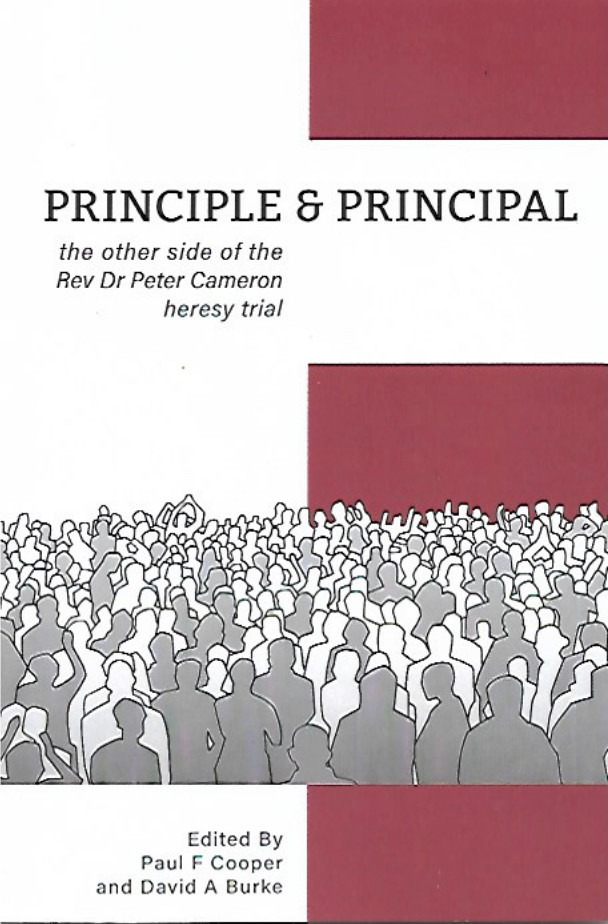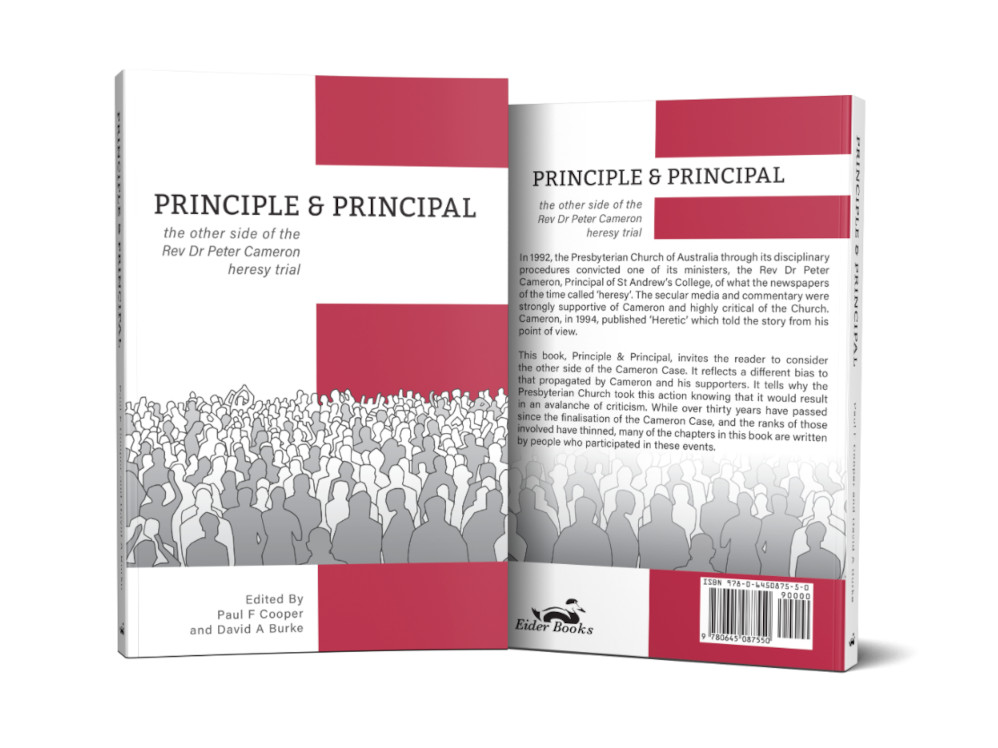Peter Cameron, the Presbyterian minister convicted of heresy by his church, once wrote, “History tends to be written by the winners, except for the odd occasions when the victims get their versions out first.”
By that standard, Cameron won. His book-length account, defiantly called Heretic, was published in 1994, two years out from his trial in 1992. By contrast, a new book, Principle & Principal, designed to “give the other side of the Cameron Case,” was only published this year.
Peter Cameron came from the liberal Church of Scotland in 1991 to serve his fellow Presbyterians in the Presbyterian Church of Australia (PCA), which was steadily becoming more conservative at the time.
In 1991, the year Cameron arrived in Australia, the PCA voted to close the office of the ministry of Word and Sacrament to women but grandfathering (or rather grandmothering) the positions of five women ministers and one female student so that they could continue to serve.
In 1977, the PCA was reduced to a third of its size as most Presbyterians entered the Uniting Church in Australia. However, the continuing Presbyterians were not all the conservative evangelical group the PCA is today.
Writing about the PCA’s “Supreme Standard”, The Bible, Paul Cooper in a Principle & Principal chapter noted “The ‘traditionalists,’ however, were a disparate group and held continuum of views of the the ‘Supreme Standard.’ These views took comfort in the words ‘contained in the scriptures’, claiming that such an expression distinguished the Word of God from the Bible itself.” Cooper gives an example of a Clerk of the NSW General Assembly (presbyterian church parliament) “somewhat Barthian influenced” view “It is not the wotds that are infallible, it’s God in Christ to whom the Scriptures point: he alone is infallible.”
The key chapter of Principle & Principal by David Burke explains why the heresy trial was necessary. “At the cost of oversimplification, the years since the 1977 church union had seen the PCA stretched between the poles of those who were conservative in church practice but theologically flexible and those who were doctrinally conservative but flexible in church practice. It is tempting to further classify this as an Australian echo of Scottish moderation and confessional evangelicalism.”
Against the background of the PCA’s recent decision to restrict the office of an ordained minister to men, Cameron lit a fuse when he preached the pro-women’s ordination “Dorcas sermon” at Ashfield Presbyterian Church in Inner West Sydney. “Cameron’s sermon was preached into the raw wounds of that decision and it served as a lightning rod for the tensions within the PCNSW: the decision to prosecute should be read in that context.”
What Cameron preached
“The Place of Women in the Church” was preached to 300 members of a Dorcas Society Rally – a Presbyterian women’s group. “It was only recently that the full significance [of the PCA decision]came home to me when I suddenly realised that the effect of the decision to ban the ordination of women is that my daughter cannot become a minister of the Presbyterian Church of Australia,” Cameron preached. “I don’t mean that she was intending to. I mean that up to that point it was only the absurdity of the position that had struck me…after that I began to get angry. My daughter…goes to the PLC Croydon. It occurs to me that these initials now stand for Presbyterian Ladies Can’t.”
Describing his sermon, Cameron told the Presbytery who tried him, “I said it is wrong to regard women as subordinate simply because a passage in 1 Timothy says so. I said, ‘So what if 1 Timothy said so? It is a mistake to condemn homosexuality simply because Paul says that homosexuality is wrong.’ I said, ‘So what if Paul says that … What I am not prepared to do is to condemn homosexuality simply because Paul does, and I am not prepared to admit that you have any right to do so or that when you do so, you are being Christian.'”
David Burke quotes the next bit of the sermon: “Are we bound by Paul’s views? It is not simply that his views are time-bound. It is actually possible that he got things wrong. There’s no reason why Paul should have been infallible.”
As Burke notes, there were good reasons NOT to try Cameron for this sermon. He was relatively unknown; the PCA code of discipline was legally complex, and there would be bad press. That last one turned out to be true in spades.
So why prosecute? And what for?
David Burke, now the Moderator-General of the PCA – the closest thing the Presbyterians have to a national leader – makes the case that the uneven composition of the PCA made it important to prosecute Cameron.
Ironically, the fact that most of the NSW church had resisted joining the Uniting Church was part of the reason for restraining Cameron.
“The PCNSW was least affected by the 1977 union and had the smallest proportion of confessional evangelicals after 1977…
“The then recent and ongoing debates over the place of Freemasonry in the church, the ordination of women and the shape and staffing of theological education had all raised tensions within the church. Equally important, they left the question of the identity of the post-union church undetermined. Was the church to be a little piece of Scotland, a stagnant billabong with a past but no future, or a living stream of Australian gospel witness?
The charge raised against Cameron, and which survived appeal, was that he was guilty of making statements inconsistent with Chapter One of the Westminster Confession of Faith. That opening chapter of the Presbyterians’ lengthy confession establishes the view that the Bible is God’s word and is infallible.
Burke again: “The key [words bolded in the quote above] are not in Cameron’s discussion about the place of women. They are in his set-up remarks on homosexuality. the place of women in the church may be the occasion and purpose of the sermon, but they are not at the heart of the logic. It’s logical heart relates to the alleged fallibility of Paul’s words in Scripture.”
Burke describes women’s ordination as “a presnting issue in the decision to prosecute Cameron but not the main issue.”
Aftermath
“Perhaps it was my inexperience and lack of skill, but I was frustrated that no matter how much I said, it was not about women’s ordination, but about the source the authority for what we believed and a minister’s obligation to support that source, that message was not present in the resultant articles,” Paul Cooper reflected on being a media spokesperson for the Presbyterians for Principle & Principal. Cooper gives a list of who interviewed him, a list including top journos of the day, some who probably would not be assigned to the story today, including Valarie Lawson of the AFR, Cindy Wockner of the Telegraph Mirror, Judy Robinson of the SMH Alon Jones of 2UE, Andrew Olle of the ABC, Jon Cleary of the ABC, Richard Carlton of 60 Minutes. Is it fair to point out there are some errors in the names in the book?
The Press release reproduced in the book avoids the word “heresy” which 30 years later the book’s editors are more comfortable with. It seems that there was no simple “cut through” wording given to Cooper, so it is not surprising to this observer that he had difficulty combatting the easy-to-grasp women’s ordination line that Cameron pushed.
Neil Chambers, minister at Bundoora Presbyterian church, who was among those alerting the Church to the Dorcas sermon, remains convinced that Cameron’s trial and conviction was a necessary and good thing. Quoting Presbyterian founding documents, he wrote in Principle & Principal, “The condemnation of Dr Cameron’s views was… the expression and clarification for many … that as a denomination in NSW we were committed to a God who has spoken, whose Word is a reliable and true record of His revealing og himself; that we are committed to …the incarnation, the atoning life and death and the resurrection of our Lord and His bestowment of the Holy Spirit … and the message of redemption and reconciliation implied and manifested in them.”

Principle & Principal; the other side of the Rev Dr Peter Cameron heresy trial Edited by Paul f Cooper and David A Burke, Eider Books, 2023, $24 +$9 postage within Australia

